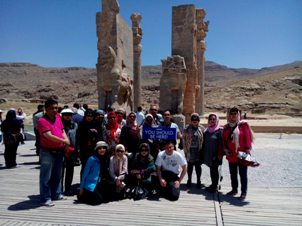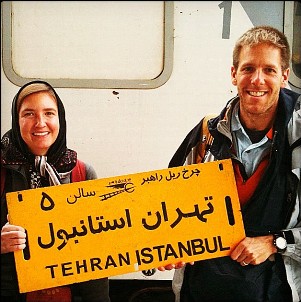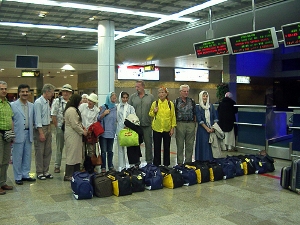Iran Prepares for an Uptick in Tourism Industry
Iran Prepares for an Uptick in Tourism
A handful of mostly European hotel groups looking to steal a march on their American competitors by moving into the Iranian hotel market, while US companies still face legal uncertainty.
 |
Most international sanctions related to Iran’s nuclear program was lifted at the beginning of this year. It aroused great interest among international companies to enter a country of 80 million that remained isolated for decades.
Representatives of the fast-growing US companies as Hilton Worldwide Holdings Inc., Marriott International Inc. and Choice Hotels International reduced either comment or said they are staying on the sidelines for now./
“We have been carefully watching the status of the US sanctions, the rule changes to these sanctions and we are evaluating opportunities resulting from these changes,” said Alex Kyriakidis, president and CEO, Marriott International Middle East and Africa./
Meanwhile, other companies are wasting no time. Abu Dhabi-based Rotana Hotel Management Corp. PJSC, the French Accor, Spain Meliá Hotels International and Germany’sSteigenberger Hotel Group are all moving quickly in anticipation of a tourism and economic boom.
Iran’s economy is the second largest in the Middle East behind Saudi Arabia.
“Everyone is waiting for international changes take effect – we go forward,” says Guy Hutchinson, Chief Operating Officer of Rotana. “We are moving full speed ahead,” he said
Rotana, which operates more than two dozen cities in emerging and often complex markets such as Iraq and Sudan, has four properties under construction in Iran, the first one, a five-star hotel with 362 rooms, will open next year in the holy city of Mashhad.
 |
Rotana can draw from their experiences in the holy cities of Mecca and Karbala in Iraq, where the alignment of pilgrims as an important source of demand presents unique challenges, said Mr Hutchinson. For example, more flexible check-in and checkout times may be needed to take account of the prayer, he said.
“If you talk to American companies, they do not necessarily have the same understanding of the markets that this virgin markets where there are special challenges in how to use,” said Mr. Hutchinson.
Frankfurt-based Steigenberger has recently signed a letter of intent to open 10 hotels in Iran, whilst the Meliá has a five-star hotel in the works on the shores of the Caspian Sea. Part of their optimism is driven by Iran’s ambition to increase the number of visitors to 20 million by 2025 from around five million by 2015.
Since the 1979 Islamic revolution, Iran’s hotel industry has been a local matter characterized by the absence of international brands. Visitors to Tehran, whether leisure or business, lamenting the lack of top-end hotel
“There is not enough space for business travelers in Tehran,” said Maryam Kiaie international business development manager for Rah Shahr, a major Iranian infrastructure firm. “We have business delegations postpone travel because of it.”
Ms. Kiaie estimates that Tehran needs 5,000 more high-value rates. Hotels can be attractive to investors because they are easier to buy and upgrade than other property types
“I think it is a very safe sector to invest in,” says Ms. Kiaie. “It’s easier to get financing to build the hotel, and there are many local investors interested in entering into a joint venture with foreign investors. It is a good opportunity for hotel chains.”
 |
Some of Tehran’s hotel markets itself as a four or five-star hotels, but analysts say most of them would not get the same classification of international standards. Rates at the two Accor branches in Tehran ranges between $ 100 and $ 140 per night.
“Iran has some great potential for growth because there is a shortage of hotels, both qualitatively and quantitatively,” says Christophe Landais, COO of Accor Iran. Paris-based Accor over the past year opened two properties under the Ibis and Novotel brand, next Tehran International Airport. It works in about 10 additional projects will be located in Tehran and Mashhad.
Since opening its doors in Iran, Mr. Landais most positive feedback from customers, he has been focusing on the Accor offer free Wi-Fi and up to 40 international channels in the bedrooms – usual offerings in the Western world, but more rare in the existing Iranian hotels.
But being an early entrant to the Iranian hotel market also took its challenges, in particular the relative inexperience of local investors with international hotel practice, Mr. Landais.
“It is an advantage (to be first) but the other side of the coin of our groundbreaking, paving the way is that it is very difficult,” he said. “We spend a lot of time explaining how the hospitality development work.”
Mr. Hutchinson likened the present Iran situation to China before it became an economic powerhouse.
“It may take a little while until it fully opens and starts to move, but when it starts (it will go quickly),” he said.
There is also a risk of Iran’s leadership abandoning its current policies that enabled the country to rejoin the international business community in the first place.
